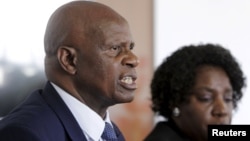Zimbabwe's finance minister indicated he has given up on convincing the International Monetary Fund and other creditors to cancel the country’s $10 billion debt. Now, he says, the country may use its natural resources in an effort to pay back the money.
Patrick Chinamasa, Zimbabwe’s finance minister, held a news conference Thursday as IMF staffers finished talks with Zimbabwean officials in Harare.
He said the government held “frank and candid” talks with the IMF regarding the country’s economy.
"And if we are sitting down as economists we agree that the fundamentals (of Zimbabwe's economy) are not in good shape," said Chinamasa. "The end game is to reach an accommodation with creditors in order to clear our arrears. I believe we have resources (that) if leveraged can also help us out of our situation."
The arrears in question are debts totaling $10 billion that Zimbabwe owes to organizations like the IMF, World Bank and African Development Bank, all of which have stopped lending to the country.
The resources are Zimbabwe's rich deposits of gold, diamonds and other minerals which if properly exploited could pump billions of dollars into the economy and help Zimbabwe pay back its creditors.
President Robert Mugabe’s government blames the current situation on Western sanctions imposed on him and ruling party officials following reports of human rights abuses and election rigging in 2002.
Domenico Fanizza, an assistant director with IMF's African Department, says debt repayment is key to reviving the country's economy.
"And the problem for Zimbabwe is that the country cannot access finances either from international finance institutions or bilateral trade," said Fanizza. "Why? Because the country does not service its debts. In other words, the country is heavily in arrears it is impossible for the country to borrow."
Last year, Chinamasa appealed in vain to the African Development Bank to write off $500 million of Zimbabwe's debt, hoping the IMF and World Bank would do the same.
Now, it seems, he is planning to ride the country’s resources back to financial health. On Wednesday, he said Zimbabwe is sending a team to Brussels, Berlin and Paris to present a plan to pay the debts -- if the creditors will give Zimbabwe time to breathe.




